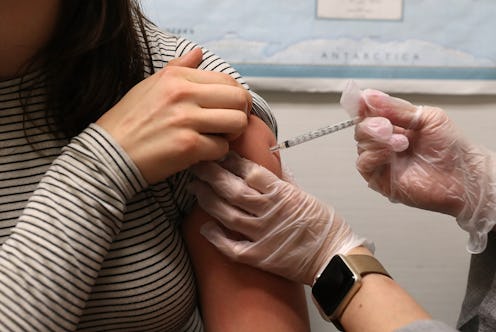Life
Here's The Easy Way To Tell If Your Health Insurance Covers The Flu Shot

With the sand still in between your toes and the tan still speckling your shoulders, it's probably hard to conceptualize that flu season is just around the corner. Just when you were getting used to Arnold Palmer drinks and cold watermelon slices, the wind patterns are already changing, the air is crisping, and summer is fading to fall. The cooler seasons come in fast and stick around for too long. So while you might have thought you didn't have to worry about icky winter sicknesses for a few more months, you'll want to know if your insurance covers a flu shot and you'll want to put that on your to do list — stat.
The best way to protect yourself from the flu is to get a shot early on in the season. Getting the vaccine can be the difference between an amazing autumn and a hellish close of the year. Fall is about being outside, enjoying the foliage, taking your chunky sweaters out for a spin and taking full advantage of the cool air before being outside becomes unbearable and too cold. If you start your fall season off with the flu, you're seriously starting off on the wrong foot. What's more, it's a totally avoidable foot.
Last year, the flu shot proved to be 36 percent effective in preventing the flu in patients who were vaccinated early on. So if prevention is an option for you, you'll want to take full advantage. According to CVS Pharmacy's website, most insurance companies not only cover the flu shot, but encourage it.
You can also get a walk-in flu shot at Walgreens, and have it covered by your insurance. And if you don't have health insurance or any government coverage, you can pay out of pocket for the flu shot — which is typically around $40.99 at Walgreens, according to their website
You can also get a walk-in flu shot at Rite Aid, CityMD, Minute Clinic, Target, Vons, Walmart, and other participating local pharmacies and urgent care centers. Influenza is incredibly contagious, so communities like to make it as easy as possible for their residents to get vaccinated. So, if you check out the Vaccine Finder for your area, you'll see just how many pharmacies offer the service. Spoiler alert: chances are, you're surrounded by walk-in facilities that offer affordable or insurance-covered flu shots.
As for when to get the flu shot, the short answer is: the sooner the better. According to the Center for Disease Control and Prevention, it takes up to two weeks for the flu shot to actually be effective in your system. The injection triggers the development of Influenza antibodies in the system, so if you're contaminated by the virus, your body already has a defense plan in action. With cases of the flu popping as soon as early fall, early October is a great time to put a flu shot on the books. That gives you a little bit more time to enjoy the warmth before committing to full fall mode. While anyone over six months old is permitted to get the shot, anyone who works in a busy public place, or with or around children is seriously encouraged to get vaccinated. While you should get the shot to ensure you're own health, you should also get the flu shot to ensure that you're not a virus conductor in your community this winter.